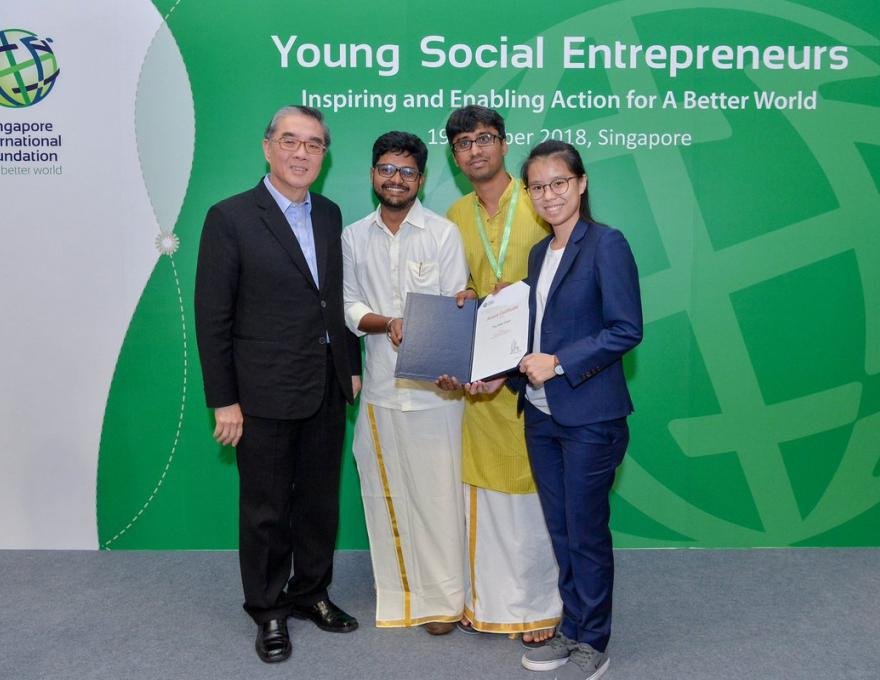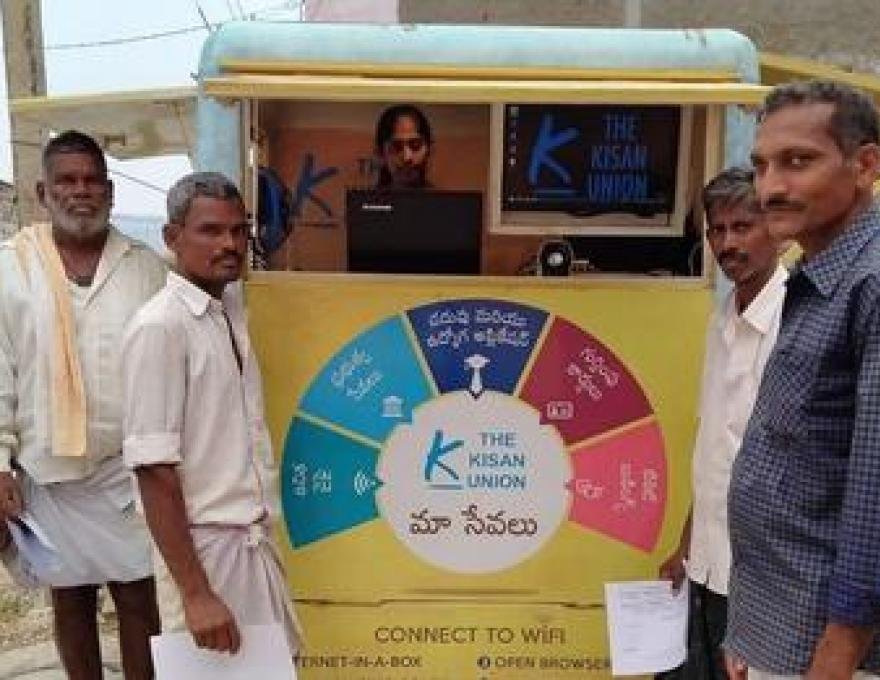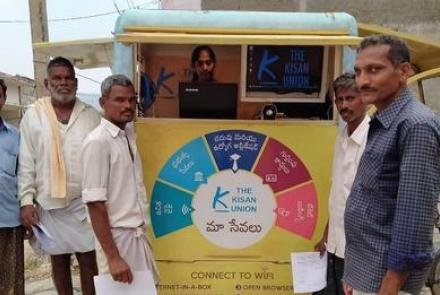A startup launched by two students Nikhil Mukkawar and Ho Jing En, ‘Kisan Union’ is taking smart services and e-commerce to doorsteps of villagers with their solar-powered electric tricycles.
In the remote village of Anumpalli in Andhra Pradesh, an electric tricycle that doubles as a smart kiosk is providing a range of services to residents of the area. These include applications for government schemes, making payments or withdrawing cash, taking printouts, and purchasing necessities through e-commerce platforms, among others.
This initiative was launched in 2019 by two students of Nanyang Technological University, Singapore – Nikhil Mukkawar (30) and Ho Jing En (24).
“We wanted to bridge the gap between villagers and access to information. Most of them are unaware of government schemes and initiatives that they can benefit from. Moreover, to carry out basic monetary transactions or any other work, they are forced to travel more than 10 kilometres. While there are web tools such as applications to help rural people, they don’t benefit them, because they often don’t have the technology like smartphones to access these tools, or they do not know how to use them altogether,” says Nikhil, a native of Andhra Pradesh.
Nikhil’s aim is to take these services to the villagers’ doorstep and provide them guidance. Today, his initiative is benefitting up to 800 people every month, and the team has launched a second kiosk at Shadnagar village in Telangana.
From project to prototype
Before moving to Singapore for his Master’s in Smart Product Design, Nikhil was working at a company that manufactured agricultural machinery in India. During his brief stint there, he would travel to remote villages in Andhra Pradesh to understand the needs of farmers.
When he interacted with them to understand why they were using bullock carts and traditional farming practices, he understood that the farmers were unaware of government subsidies. Even if they were aware, they avoided applying for them because they had to travel long distances to submit forms and documents.
In 2018, during a college project at NTU, he decided to work on the gap between farmers and technology. He worked along with his classmate Ho Jing En, a friend and resident of Singapore.
“After months of brainstorming, we ideated an electric-powered tricycle with a small kiosk mounted over it. This could be driven to rural areas to provide necessary help,” says Nikhil, adding that their project was named The Kisan Union, and was submitted as a written document.
This project won the Young Social Entrepreneur competition in 2018, for which the duo received a cash prize. Using that, they incubated their startup at NTU and began working on the prototype.
“First, we designed a small-scale 3D model at the university’s lab. Once it was approved, back in India, I approached suppliers in Chennai for raw materials. Finally, a fabricator in Visakhapatnam built the electric tricycle for Rs 95,000,” says Nikhil.
Their prototype was deployed at Anumpalli village, which has a population of 3,000 people, primarily farmers.
Services at the doorstep
By the end of 2019, the team was equipped with a pedal-cum-motor tricycle that could navigate small roads. It was powered by a 48-volt motor and could go 35 kilometres on a full charge.
The kiosk was fitted to the back and operated by a resident of Anumpalli village. Before being hired, she was trained for three months on how to operate the laptop, use Excel sheets, and more.
“We decided to train a person from that particular village so that the residents would trust the kiosk,” says Nikhil.
At first, the kiosk did not have too many visitors. Some curious children would walk up and enquire. On hearing that printing services were available, they would scan or print material for school. Up to three sheets were printed free of charge, and the students were charged a nominal fee for additional sheets.
However, within a week or two, adults, mainly farmers, began enquiring at the kiosk as well.
“To help them access government subsidies, we needed to understand their needs. So we used a form developed by Haqdarshak, a platform that provides information about government schemes. This had 15 questions which helped them understand eligibility for various schemes. After this, the operator provided advice on which scheme to opt for and helped the farmer apply for the same. If the scheme could not be applied for online, the operator would explain the documents that the farmers would need to carry to the nearest government office,” says Nikhil.
The kiosk also allowed monetary transactions such as checking bank balances without a passbook, as well as withdrawing and sending money. This was powered by ApnaPay, a cloud-based solution that also provided the kiosk with a money dispensing system.
“The residents would need to bring only their debit card to use this service,” says Nikhil.
The kiosk is powered by LinQ, which brings several e-commerce platforms under one ambit. This includes Amazon, Redbus and more. Using this, residents could make purchases for mobile phone covers, chargers and more.
“Finally, we partnered with a company named Lensfit which sold good quality eyewear at nominal prices,” says Nikhil.
Apart from this, the kiosk has an intranet service where users can connect to its wifi and access information related to farming.
Dinesh Kumar (28), an engineering graduate, is the operations manager at The Kisan Union. In 2019, he spent two months working on ground after it was launched at Anumpalli.
He says, “Initially the printing services were a hit among villagers because the nearest printing shop was located eight kilometers from the village. Later, farmers began trusting the service as well. After learning about the benefits of certain schemes, they would be overjoyed and spend an entire day at the kiosk until the process was completed. Sometimes, there were college students who visited the kiosk and asked for my help in writing their resumes. I also helped them upload their resume to job portals like Naukri.”
Expanding to other villages
After running their pilot project for a few months, the team noticed that 800 people benefitted every month. This prompted them to launch a second kiosk of the same model at Shadnagar in Telangana.
“By mid-2020 we had launched the second kiosk. It took off well, but owing to COVID-19 restrictions and for safety precautions, we had to pause operations. However, we hope to resume our services in a month,” says Nikhil.
For the future, the team hopes to collaborate with more service providers, and they hope companies will franchise their smart kiosks and empower rural areas across the country.
- Anumpalli Village , Pamidi Mandal, Andhra Pradesh
- nikhil_mukkawar@yahoo.com
- 9176480710
- http://www.thekisanunion.com/






Add new comment